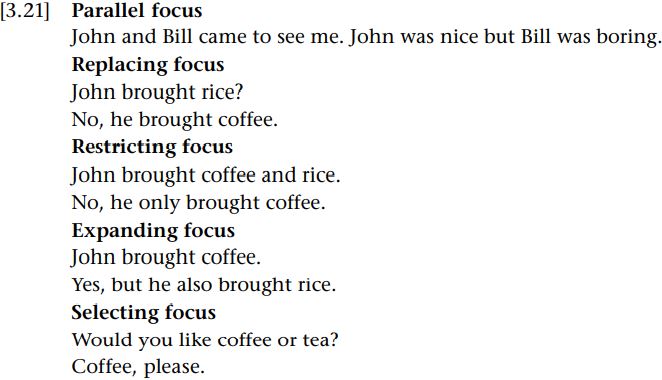
Contrast
 المؤلف:
Jonathan Culpeper and Michael Haugh
المؤلف:
Jonathan Culpeper and Michael Haugh
 المصدر:
Pragmatics and the English Language
المصدر:
Pragmatics and the English Language
 الجزء والصفحة:
71-3
الجزء والصفحة:
71-3
 4-5-2022
4-5-2022
 706
706
Contrast
Is considered an important feature of focus (see especially Chafe 1976), whether semantic or cognitive. In the example above discussed in relation to prosody, the fact that Jonathan gave his students chocolate implicitly involves a contrast both with his usual lack of generosity and with the usual behaviors of others. Of course, such a contrast can be couched in terms of deviation, as articulated in foregrounded theory. There is a contrast with the known regularity of other behaviors. This is more of a cognitive contrast. In the literature on information structure, contrast involving semantic focus is usually taken to involve the contrast of an item with a restricted set of alternatives (see, for example, the special issue on contrast, Repp 2010; also Rooth 1992). Miller (2006: 512) provides a useful list of various types of focus, each with an example:

In each case, particular items are highlighted in specific contrastive ways with alternatives in a restricted set made explicit by the previous discourse.
As these examples also illustrate, contrast need not involve diametric opposites. Lambrecht (1994) argues that contrastiveness is a scalar notion, citing in support Bolinger (1961:87):
In a broad sense, every semantic peak is contrastive. Clearly in Let’s have a picnic, coming as a suggestion out of the blue, there is no specific contrast with dinner party, but there is a contrast with picnicking and anything else the group might do. As the alternatives are narrowed down, we get closer to what we think of as a contrast accent.
The notion of contrastiveness as scalar links to the notion of scalar implicatures, something we will discuss.
 الاكثر قراءة في pragmatics
الاكثر قراءة في pragmatics
 اخر الاخبار
اخر الاخبار
اخبار العتبة العباسية المقدسة


